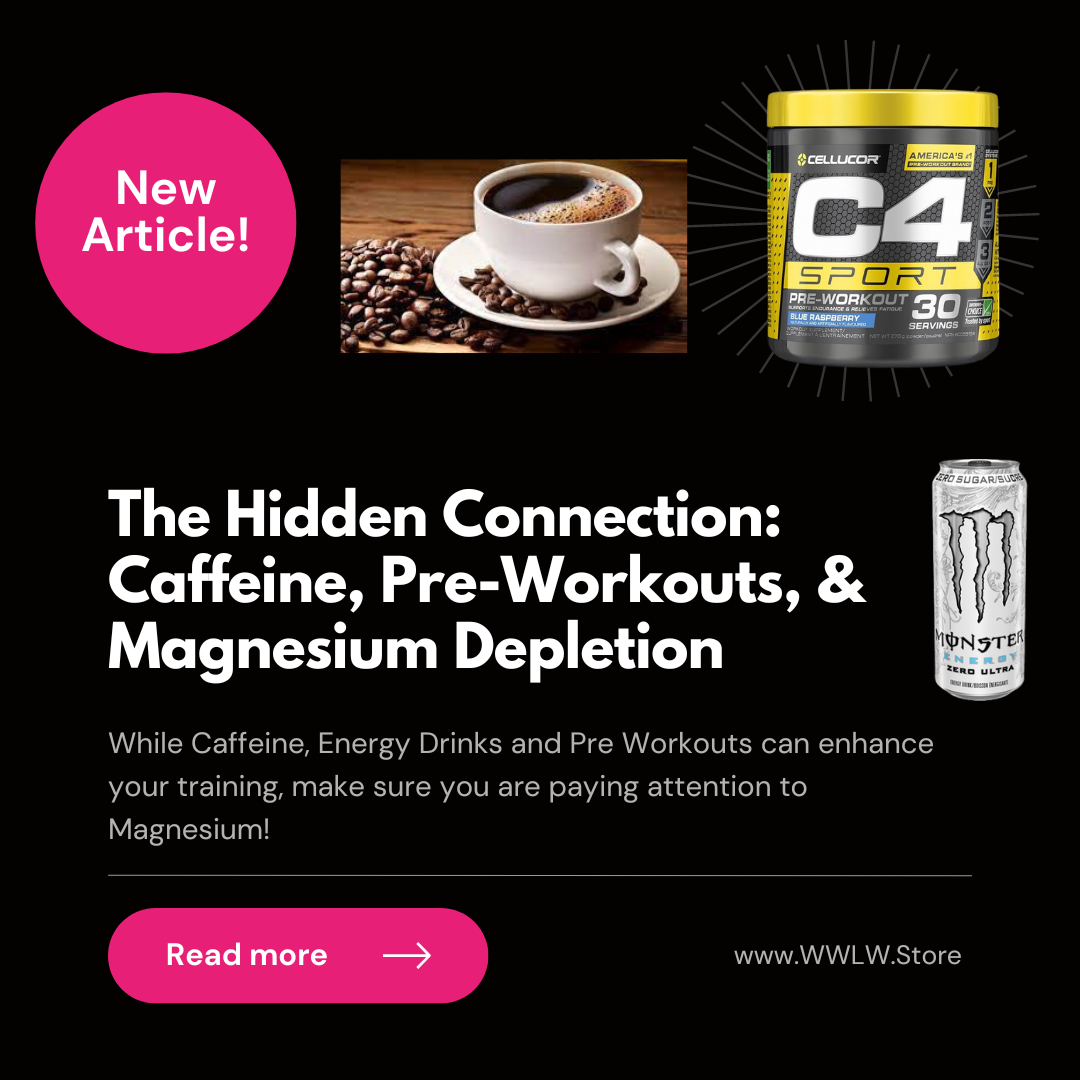The Hidden Connection: Caffeine, Pre-Workouts, and Magnesium Depletion
By Coach Robert King
In the quest for that extra boost of energy before hitting the gym, many of us turn to caffeine, energy drinks and pre-workout supplements.
While they can certainly provide a temporary surge in energy and focus, what often goes unnoticed is their potential impact on essential minerals like magnesium.
The Magnesium Factor
Magnesium is a vital mineral involved in over 300 enzymatic reactions within the body, including energy metabolism and muscle function. It plays a crucial role in muscle contraction and relaxation, making it indispensable for athletes, especially those engaged in strength training.
Caffeine and Pre-Workouts: The Culprits
Caffeine, commonly found in coffee, tea, energy drinks, and pre-workout supplements, is known for its stimulating effects on the central nervous system. While moderate caffeine consumption has been linked to improved exercise performance and focus, excessive intake can lead to adverse effects, including the depletion of magnesium.
Pre-workout supplements often contain high doses of caffeine along with other stimulants to enhance energy levels and workout intensity. While these supplements can be effective in the short term, their prolonged use without proper moderation and awareness of their ingredients can contribute to magnesium deficiency.

The Depletion Mechanism
Both caffeine and certain ingredients in pre-workouts act as diuretics, increasing urine production and promoting fluid loss from the body. Along with fluids, these substances also flush out essential minerals, including magnesium, through the kidneys.
Moreover, caffeine stimulates the release of stress hormones like cortisol, which can further deplete magnesium stores in the body over time. Chronic stress, coupled with high caffeine intake, creates a vicious cycle of magnesium loss and impaired recovery, potentially leading to muscle cramps, fatigue, and reduced exercise performance.
Finding Balance: Tips for Maintaining Magnesium Levels
Moderate Caffeine Intake: Aim for a moderate caffeine intake of no more than 400 milligrams per day, equivalent to about four cups of brewed coffee. Be mindful of hidden sources of caffeine in energy drinks, sodas, and even certain medications.
Read Supplement Labels: Before consuming pre-workout supplements, carefully read the labels to understand their caffeine content and other ingredients. Consider opting for products with lower caffeine doses or explore caffeine-free alternatives.
Diversify Your Diet: Incorporate magnesium-rich foods into your meals, such as leafy greens, nuts, seeds, whole grains, almonds and legumes. While supplementation may be necessary for some individuals, prioritizing dietary sources can help maintain optimal magnesium levels naturally.
Hydrate Wisely: Stay hydrated before, during, and after workouts to support proper fluid balance and minimize the risk of dehydration-induced mineral loss. Opt for water or electrolyte-rich beverages over excessive caffeine or sugary drinks.
Use Magnesium Supplements: In addition to dietary sources, incorporating magnesium supplements into your routine can help replenish depleted stores, especially for individuals with increased magnesium needs due to intense physical activity or inadequate dietary intake. However, it's essential to consult with a healthcare professional before starting any new supplementation regimen to determine the appropriate dosage and ensure compatibility with your individual health status.
Conclusion
While caffeine and pre-workout supplements can provide a temporary energy boost for your workouts, it's essential to be mindful of their potential impact on magnesium levels. By practicing moderation, reading labels, and prioritizing a balanced diet, you can support your body's magnesium needs and optimize your performance in the gym without compromising your long-term health.
Remember, a well-rounded approach to nutrition and supplementation is key to achieving your fitness goals while maintaining overall well-being.
When it comes to using Magnesium supplements I personally use and recommend two types. I use an oral magnesium and a topical spray. I find the combo of both to be excellent.
You can get more info on our WWLW Magnesium Supplements HERE.


0 comments